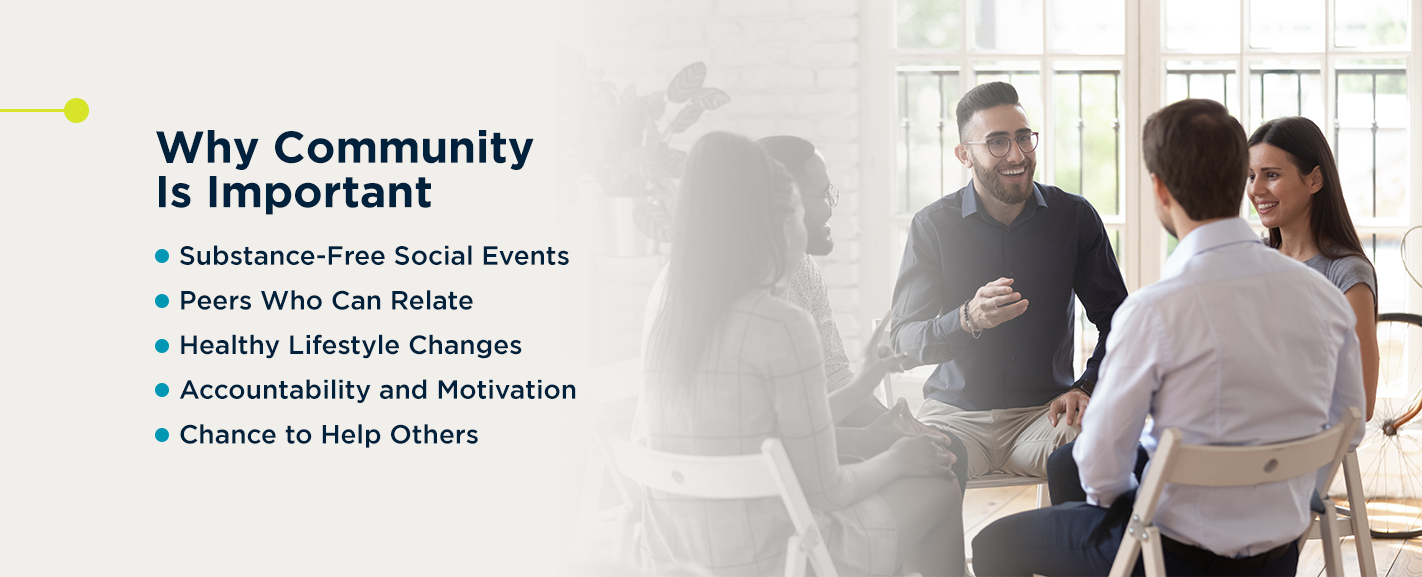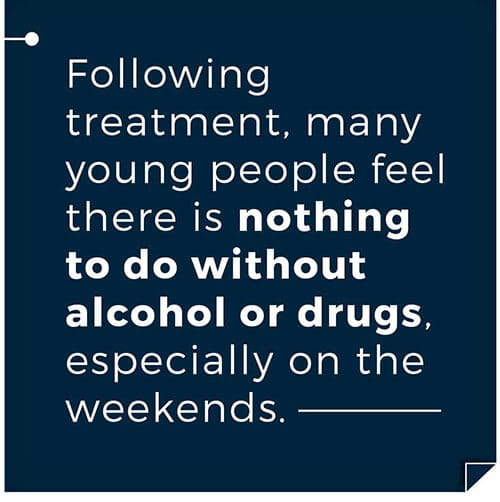- Jun 3
- Addiction Recovery AlumniPreventionRecovery
For many people, leaving treatment presents a whole new set of obstacles to overcome. One way to face these obstacles is to get involved with a recovery community. A recovery community gives people the opportunity to connect with others who have shared experiences and helps build a strong, long-term support network.
Support in recovery provides access to substance-free activities, many of which contribute to stronger physical and mental health. Peers in similar situations can offer helpful advice and accountability. Recovery communities help contribute to long-term, healthier and more fulfilling substance-free lives.
- Why Community is Important
- Fighting Isolation with a Recovery Community
- Contact Gateway Foundation for Community Recovery Resources
Why Community is Important
Community is vital, according to Marty Cook, director of alumni events for Gateway Foundation. He started a recovery community in the northern suburbs and continues growing that community in his role at Gateway.
“I’ve had the great fortune of seeing people who didn’t know each other come to events, get to know each other, and they’re best friends,” Cook says. “They go to 12 Step meetings together, they work out, they study together and they support each other. But that’s not possible if there’s not a concerted effort by recovery groups or hospitals to add that extra layer of support for them.”
Peer-supported recovery offers patients the foundation they need, raising them up and creating new connections. It helps cure feelings of loneliness and isolation post-treatment. Having access to a community has many benefits, including the following:
1. Substance-Free Social Events
Some patients in recovery struggle to find social events in which alcohol is not present. Excess drinking is a prevalent issue among younger generations. As a result, finding a support system may be even more challenging for young adults.
Following treatment, many young people feel there is nothing to do without alcohol or drugs, especially on the weekends. This feeling can cause some to isolate themselves and lose human connections and interactions, which can be detrimental to mental health. Others may fall back into the same crowd of friends as before and start drinking or using drugs once again.
Cook offers some insight into why a recovery community is critical for this age group. “People get sicker sooner now,” Cook says. “Even 10, 20 years ago, people would maybe get into treatment in their 30s, 40s or 50s, but they’re coming in in their 20s now, and when you’re in your 20s, most of your friends are out on weekends, there’s not a spouse, kids, so what do you got? The social network you used to have is kind of cut off because it’s built around parties and bars and alcohol and drugs, etc.”
A recovery community lets patients socialize in a substance-free setting. Socializing and enjoying sober activities helps make post-recovery life full and exciting, boosting mental health and contributing to success. These events and activities reduce the chances of falling back into the same routines, especially for young people.
2. Peers Who Can Relate
A recovery community also provides access to peers in similar situations. Life after treatment can feel isolating, but a community of those who are walking the same path can make the journey less lonely. Others in recovery can help a patient understand new feelings, face new challenges and enjoy self-discovery.
3. Healthy Lifestyle Changes
Community events contribute to a healthier body and mind, supporting a holistic recovery. These social events, whether bowling, painting, hiking or volunteering in the community, provide healthy physical and mental stimulation. Exercising and spending time outdoors have significant health benefits. Access to a community with a shared foundation of recovery can lead to other healthy lifestyle changes.
Post-treatment patients might even discover a new passion, which they can enjoy beyond the recovery community. They’ll have the chance to broaden their social circle, centered around substance-free activities. Patients may join a yoga studio, sports team or book club. In any case, community activities can help establish healthy hobbies.
4. Accountability and Motivation
Patients are less likely to fall back into old behaviors when they have a support network holding them accountable. It’s much easier to ask for and receive accountability from those with shared experiences, who can offer helpful advice and insights. Those in the support community will be able to spot behavioral changes and provide a unique perspective. They’ll help keep the patient on track and celebrate successes.
5. Chance to Help Others
A long-term benefit of joining a recovery community is the chance it offers to help others. Studies find those who help others in recovery are more likely to maintain a substance-free life. Providing insight, advice and accountability for others can make recovery more fulfilling and decrease the odds of a relapse. Recovery communities offer both the opportunity to be mentored and the opportunity to mentor others, both of which contribute to long-term success.
Fighting Isolation with a Recovery Community
Although Gateway’s recovery events are usually open to all ages, the focus on young adults for some of these events aims to connect young adults beyond specific treatment sites and beyond Gateway. Gateway’s recovery community has a monthly social in addition to a variety of other events that occur throughout the week as well as on weekends. The Chicago social takes place on the first Saturday of the month. To keep up with all recovery events, like us on Facebook and check out our event calendar.
Gateway’s recovery community is open to anyone in recovery. “We’re not just saying ‘alumni,’ we’re saying if anybody is in recovery, come to our events. Because their experience could help us, just as our alumni can benefit from them,” Cook says. “Everybody wins.”
Contact Gateway Foundation for Community Recovery Resources
Community-based recovery is powerful. It provides unique resources post-treatment, including peers who can understand the struggles of a substance use disorder. It also offers access to healthy social activities and hobbies. With community resources, the journey of recovery is no longer lonely.
If you or someone you know would like to get involved with a recovery community, consider Gateway. We offer a wide range of substance use disorder recovery services, both residential and outpatient. Our caring, compassionate staff help people enjoy freedom from substance use disorders. To learn more about our alumni events, please email Marty Cook at MrCook@GatewayFoundation.org or give Gateway a call at 877.381.6538.




